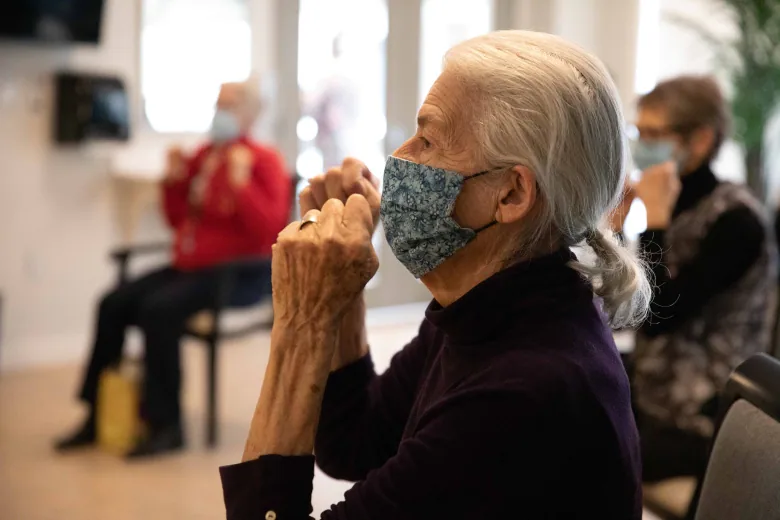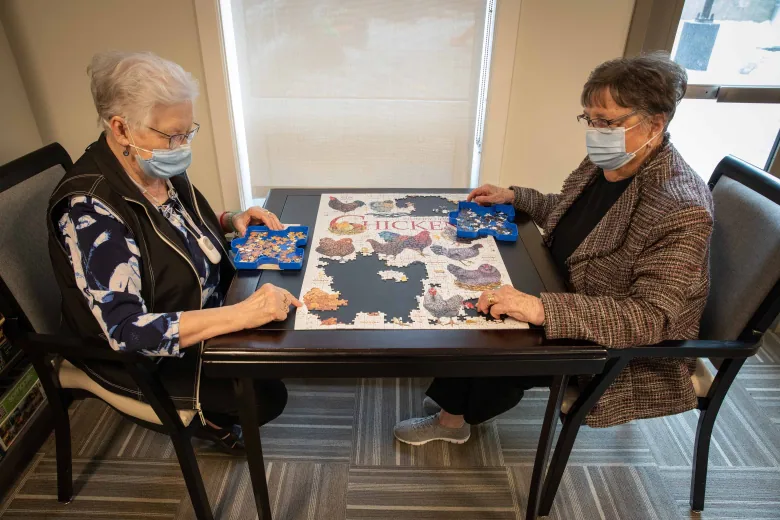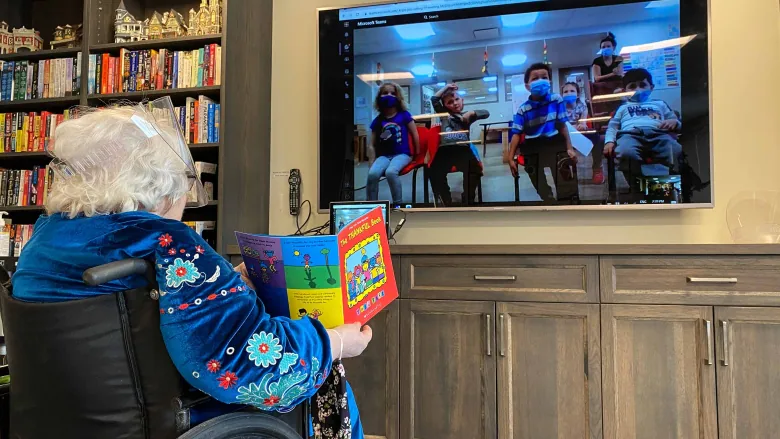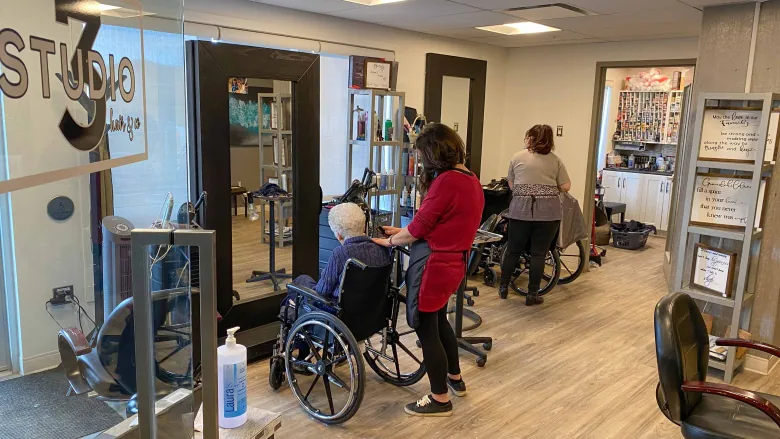Like many other seniors, retired teacher Jim Nedelcov found himself trapped in his own apartment, bored and lonely when a lockdown was imposed about a year ago to fight the COVID-19 pandemic.
For the 82-year-old grandfather, the antidote to loneliness was to move into a retirement community, despite the increased risk of infection from living in a communal setting.
Nedelcov moved into an apartment in Harbour Landing Village, a private retirement residence in Regina. It had implemented strict measures to keep residents safe but also promised something that many seniors have had to abandon during the pandemic: recreational activities and the chance to socialize.
“When you wake up in the morning, you’ve got to have something to do,” said Nedelcov.
He says he likes to take exercise classes and shoot pool with other residents.
“There’s everything to do if you want to do it,” he said. “You’ve got to get out and get at it.”
Much of the national spotlight over the past year has focused on the plight of seniors either facing deadly COVID-19 outbreaks at long-term care homes or crippling isolation inside their own homes. But some seniors have managed to avoid loneliness and the coronavirus in facilities similar to Harbour Landing Village.
“It’s common to find places where seniors, although locked in a community, still have reasonable freedoms and interaction within that community, still following the [COVID-19] rules, of course,” said Bill VanGorder, spokesman for CARP, which lobbies on behalf of seniors.
“It just gets buried under all the bad news about long-term care homes.”
VanGorder said a CARP survey of its 325,000 members found about 90 per cent of seniors want to stay in their own homes, but what that home looks like is evolving.
“It can mean a house. It can mean co-housing. Or a retirement residence,” he said. “But, it’s in their community, and it’s not that old-style, hospital-like warehousing of seniors with cookie-cutter care.”
Finding the balance
Experts have warned that seniors living alone who are socially disconnected during the pandemic are particularly vulnerable to declining mental and physical health.
When the pandemic began, Harbour Landing Village immediately closed its coffee shop and hair salon, restricted dine-in service at its restaurant to residents, banned visitors and created separate cohorts of seniors and staff that do not mix with each other. Seniors aren’t allowed to leave the home to visit their family’s homes or stores.
But the facility was keen to avoid halting activities and socialising altogether.
“We didn’t want to see our residents locked in their rooms,” said CEO Jansen Anderson. “The ability to interact with others around you and know that you’re not alone and have everyone there supporting you — both staff and your neighbours — is very, very important to anyone.”

Instead, the facility combined restrictions, screening, sanitation and vigilance from employees — who are not permitted to work anywhere else — to make itself a “fortress.”
The privately owned residence is a four-storey building that has 40 seniors in apartments on the top two floors and another 35 in a licensed nursing home on the second floor. There is also a daycare, restaurant, coffee shop and hair salon in the building. Seniors can live independently in their own apartments and add additional care options at a cost.

‘So many opportunities’
Jan Gavel, a retired nurse, also decided to move into the home during the pandemic. She was diagnosed with cancer in September 2020 and decided it would be easier to focus on her health if she sold her condominium and moved into the retirement residence, where she could ask for help if needed.
She takes part in as many activities as possible inside the building, which follows public health orders for gathering, physical distancing and masks. She hasn’t been able to visit her son or daughter in person for much of the year but has managed to avoid lonelines by staying activem she said.
“There’s so many opportunities [for] trying new things,” she said. “I’ve made a lot of really good friends here, and everybody is friendly and open.”
Retired Grade 1 teacher Lee Eisler, 72, used to visit the children attending daycare in the building. She isn’t allowed to see them or her own grandchildren now, but she rolls her wheelchair in front of a television screen and reads to the children at the daycare virtually. She’s introduced as “Grandma Lee.”
“I’ve always loved being around children. So, it’s a great way to spend my year,” said Eisler.

Not stressed about vaccine wait
The retirement home has not had any cases of COVID-19 so far, and seniors who spoke to CBC News said their quality of life has made them less anxious about waiting their turn for the vaccine.
“It didn’t bother me one way or another,” said Nedelcov, who received his first dose of a vaccine in February. “It was just another event, another half hour in my day type of thing. And I’m fine with that. I’ll be fine with the second dose, whenever that comes.”
Most provinces have prioritized vaccination for seniors living in long-term care facilities and nursing homes. In Saskatchewan, all long-term cares homes have received the first dose of vaccines for residents. The health authority is now moving on to seniors over 70, starting with those living in communal settings such as senior residences and apartment complexes or condominium complexes with shared spaces.
The seniors who live in Harbour Landing Village’s nursing home section have all received two doses of vaccines, and those over 70 who live in the assisted living unit have each received one dose.
Gavel, who is still undergoing cancer treatment and is immunocompromised, said she was not hesitant to get the shot but could have waited a while longer if necessary because she feels protected inside the residence.
“If I could have, I would have said, ‘No, I don’t want that vaccination. I want to give it to a teacher or I want to give it to one of the health-care professionals,'” she said.

Lee Eisler was happy to get her first shot but said she wasn’t anxious about the prospect of waiting.
“Sure, there are times when I think, ‘Oh, I wish this was over,'” she said. “But on the other hand, we’re in a safe place where we’re well-looked after. So I think we don’t really have anything to be complaining about.”
Anderson said no place is “impenetrable” and there is a certain amount of luck involved in whether or not someone contracts the virus so he is relieved that the residents have all had at least one dose.
“The pressure has been significant,” he said. “The world that we work in represents some of the most vulnerable people out there for this virus. And, you know, the stress of the past year has been a lot.”




